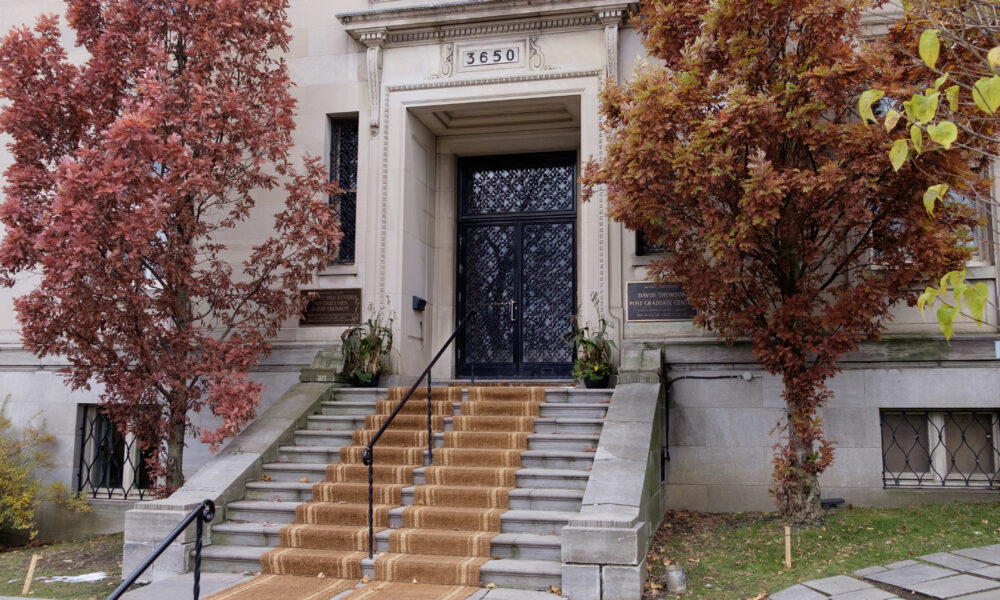The Tribune’s editorial board presents its midterm reviews of the Post-Graduate Students’ Society (PGSS) executives. Tribune editors researched and communicated with each executive before leading an editorial board discussion on the executives’ work and accomplishments. Editors with conflicts of interest abstained from discussing, writing, and editing relevant reviews.
Secretary-General: Satish Kumar Tumulu
Tumulu has been the PGSS Secretary-General since June 24 and is in charge of representing PGSS to other university bodies, including the McGill Senate and Board of Governors, overseeing the PGSS governance documents, and chairing the executive committee. He entered the position concerned that students were not able to get in touch with their PGSS representatives when they needed to and believes that PGSS has successfully improved communication with constituents during his tenure. Tumulu sees funding as one of the most pressing issues facing post-graduate students—PGSS’ recently-published 2022-2023 McGill Graduate Student Funding Report states that 88 per cent of McGill graduate students make “less than a sustainable income”—and advocates for better funding and grant opportunities for post-graduate students. He also meets with the Association of Graduate Students Employed at McGill—which is currently bargaining with McGill over a new collective agreement for teaching assistants—to stay up to date on their work. Next semester, Tumulu has important goals to tackle: He hopes to increase attendance at the Feb. 7 General Meeting (GM), as this semester’s GM did not reach quorum, to tackle structural issues within the Society, and to potentially simplify the insurance process for students. Tumulu’s goal of increasing funding and grant opportunities for post-graduate students is crucial; The Tribune urges further coalition-building and the wielding of Tumulu’s spots on McGill’s highest governing bodies to better students’ working and living conditions, and to hold the university administration accountable.
External Affairs Officer: Ansley Gnanapragasam
As External Affairs Officer, Gnanapragasam aims to enhance the organization’s involvement in provincial and federal political affairs. His noteworthy accomplishments include fostering ties with other student unions, like the Concordia Student Union, and exploring PGSS re-joining the Quebec Student Union. Gnanapragasam has initiated discussions on student and research funding, with a potential town hall with a Member of Parliament in the works. His main priorities for the upcoming semester are continuing ongoing projects and establishing “interdisciplinary inter-university sessions,” such as a case competition across various Quebec universities. Gnanapragasam explained that PGSS avoids taking firm stances on global political issues, such as the ongoing conflict in Gaza, to avoid stoking tensions among a diverse student population. Ongoing and future initiatives include addressing French translation costs and exploring collaborations with other universities while balancing both francophone and anglophone student needs. Looking forward to the next half of his term, Gnanapragasam emphasized careful planning as he is diligently working on completing the projects that he has undertaken to ensure that all McGill graduate students feel adequately represented. Overall, Gnanapragasam’s work to build connections and improve funding is important, but The Tribune calls for PGSS to reconsider its position on political statements and take a stand for human rights when geopolitical crises arise.
Internal Affairs Officer: Cindy García
The Internal Affairs Officer is in charge of organizing and marketing PGSS events in response to constituent feedback, overseeing the PGSS orientation, communicating with Post-Graduate Students’ Associations, and recruiting to PGSS committees. García recently assumed the role on Nov. 6 and has been focused on going through student feedback and brainstorming events in her first weeks on the job. Next semester, García hopes to run events with a focus on environmental, financial, and social sustainability and is particularly focused on finding ways to better immerse post-graduate students in the university community. While she is still in her first weeks on the job and knows she still has a lot to learn—for example, about student unions’ advocacy around tuition hikes—García’s commitment to catering to students’ needs, listening to feedback, and sustainability are admirable.
Financial Affairs Officer: Faezeh Pazoki
As Financial Affairs Officer, Pazoki has undertaken responsibilities pivotal to the organization’s financial health. Pazoki’s overarching goals have focused on optimizing the PGSS budget for equity and inclusion, notably implementing transparency measures such as including monthly budget actuals in her council reports. Her accomplishments this semester include successful crowdfunding for travel awards and need-based bursaries, demonstrating effective budget management without resorting to fee increases. Challenges, such as navigating the effects of inflation as well as Memorandum of Agreement negotiations with Macdonald Campus Graduate Student Society, were met with careful planning and collaborative approaches. As her term concludes in December 2023, Pazoki is prioritizing a seamless transition for the incoming Financial Affairs Officer. It is imperative that the transparency Pazoki has created through tangible action continues under the next Financial Affairs Officer.
Member Services Officer: Sabrina Yusuf
The PGSS Member Services Officer manages services offered to PGSS members and issues related sustainability. They are responsible for the Grants Program, the Member Legal Defence Fund, the Health and Dental Insurance Plan, and the PGSS annual handbook. At the start of her term, Yusuf hoped to bring back services that had been cut during the pandemic and strengthen the PGSS’s health and dental insurance coverage. However, she came into her role not knowing the full extent of how nuanced insurance is, and found it challenging to find an option that balanced the need for more complete coverage with the need for affordability. Even without any changes, the insurance plan has become more expensive annually for the past few years because of the sheer volume of claims that have been put in, especially those related to mental health. Yusuf has been looking into ways to prevent students from needing to put in so many claims, including the possibility of offering different providers to provide telehealth psychotherapy—making it not only less costly but more accessible to students in general. Yusuf has also been involved in PGSS’s transition from Desjardins to a new insurer, GreenShield, which she noted was not as smooth as the team would have liked. In this process, she noticed the need for transparency with PGSS members, and has been working to keep members informed on the switch, why they made it, problems that arose and their solutions, and any other updates. As a part of this initiative, she helps run a town hall focusing on the insurer transition, which PGSS publicized through their listserv, flyers, their website, and presidents of different Post-Graduate Students’ Associations. Yusuf wants to focus on improved transparency within the Society for the rest of her term. She also works directly with the BIPOC Coordinator, the International Student Caucus, and the Mental Health Coordinator in supporting students affected by ongoing geopolitical crises.
University Affairs Officer: Racchana Ramamurthy
As University Affairs Officer, Ramamurthy takes on a host of responsibilities to ensure that graduate students’ voices are heard at all levels of the university. Coming into the semester, Ramamurthy’s main priorities included improving graduate student funding and rectifying issues with supervisors—both of which she has made significant progress on. Her biggest accomplishment to date is her success in garnering the McGill administration’s acceptance of the recommendations detailed in the 2022-2023 McGill Graduate Student Funding Report, developed by the Funding Working Group. The accepted recommendations include providing students who receive external awards with a 10 per cent increase in funding, encouraging supervisors to provide cash advances for conference fees and speeding up reimbursements, and working towards ensuring that all students receive the provincial minimum wage rate. Ramamurthy strives to educate constituents on the avenues available to them to address issues with supervisors, including using the required progress tracking system to report bad conduct by supervisors. Ramamurthy has also done an impressive job advancing the interests of graduate students within the university administration and moving forward, she hopes to address communication issues that have led to a lack of recruitment for university committees. Given her success on the funding front, recruitment should be a priority in the upcoming semester to ensure that all student voices are represented.





